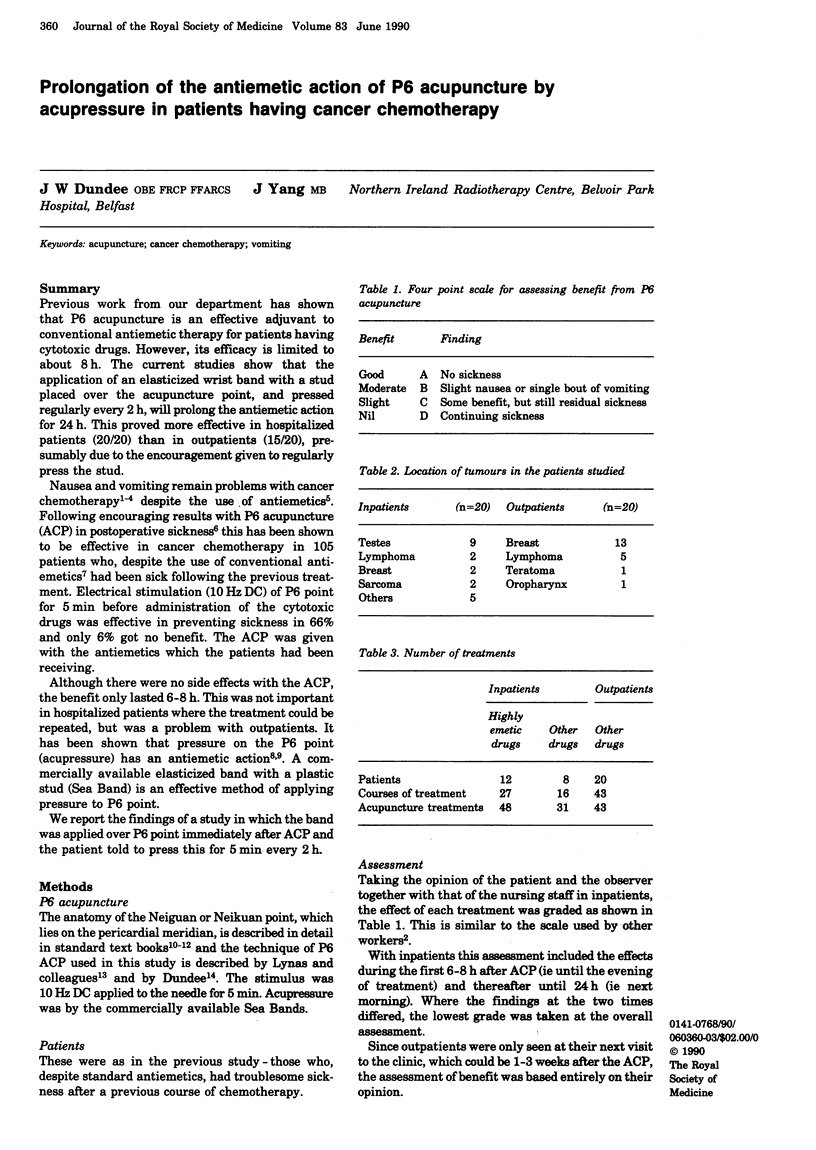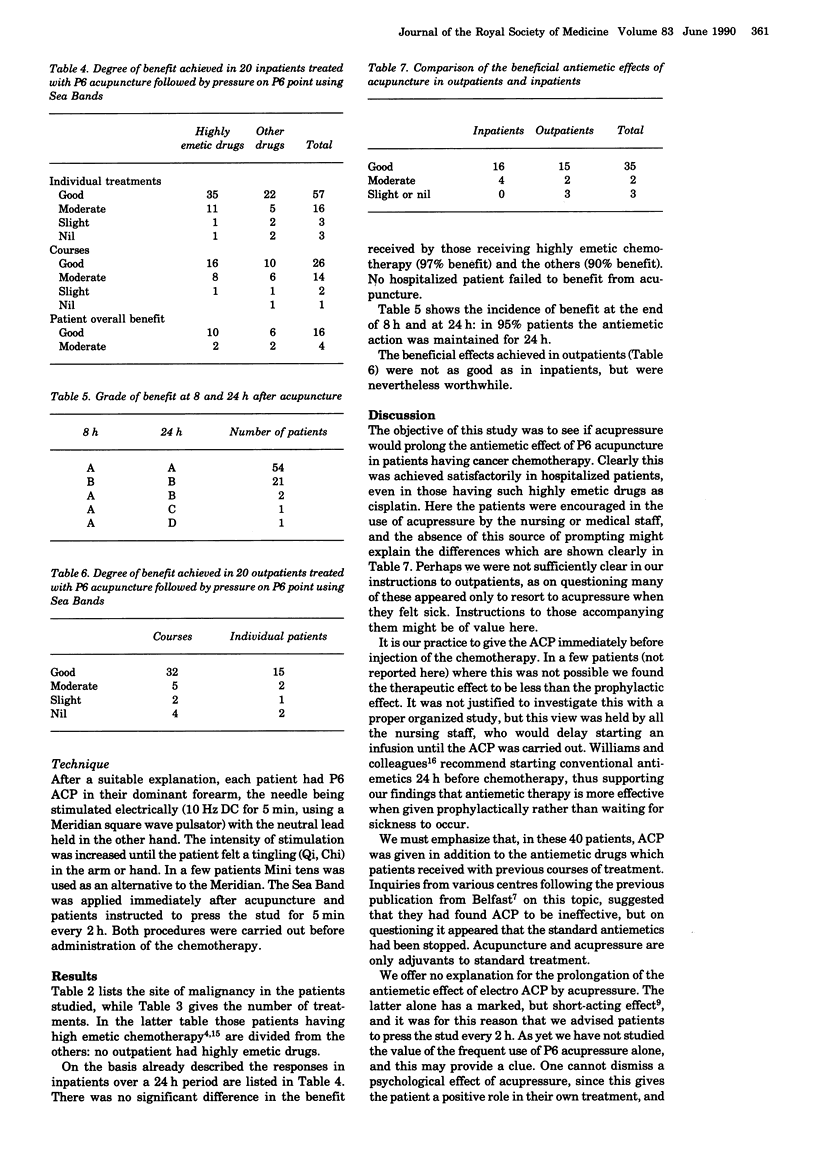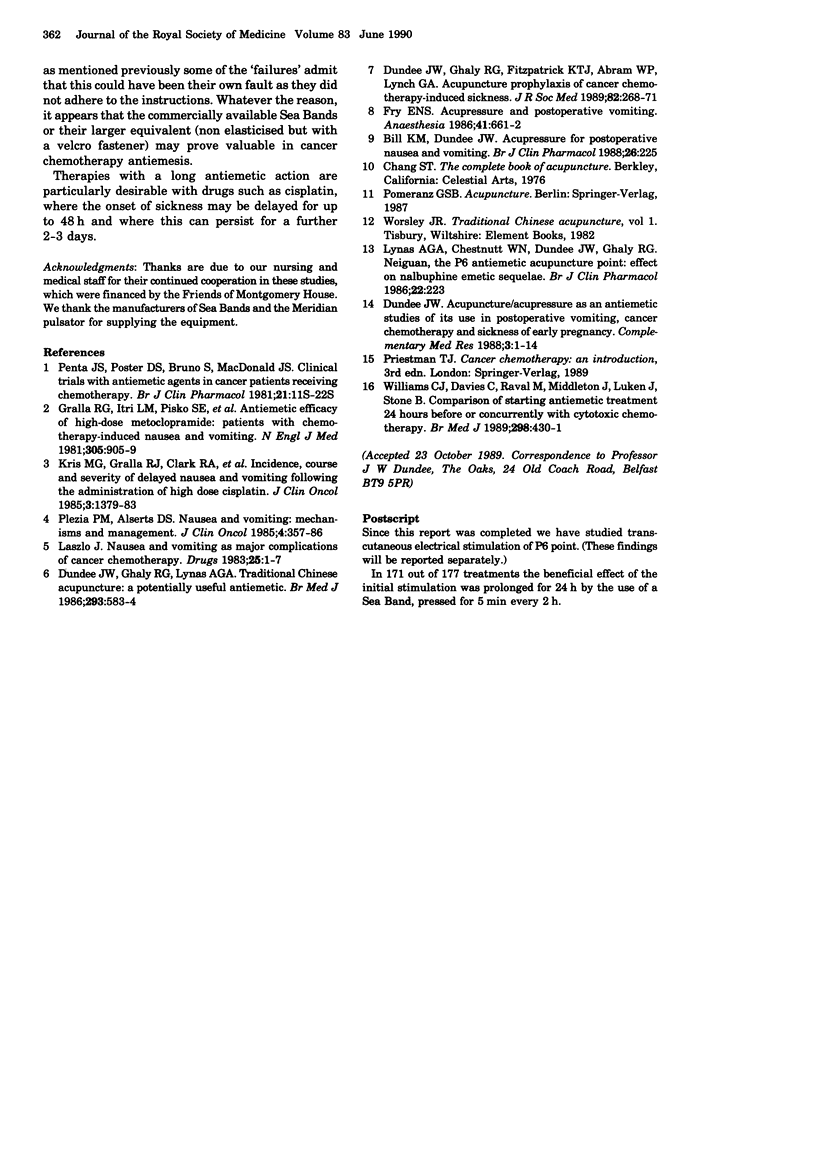Abstract
Previous work from our department has shown that P6 acupuncture is an effective adjuvant to conventional antiemetic therapy for patients having cytotoxic drugs. However, its efficacy is limited to about 8 h. The current studies show that the application of an elasticized wrist band with a stud placed over the acupuncture point, and pressed regularly every 2 h, will prolong the antiemetic action for 24 h. This proved more effective in hospitalized patients (20/20) than in outpatients (15/20), presumably due to the encouragement given to regularly press the stud. Nausea and vomiting remain problems with cancer chemotherapy despite the use of antiemetics. Following encouraging results with P6 acupuncture (ACP) in postoperative sickness this has been shown to be effective in cancer chemotherapy in 105 patients who, despite the use of conventional antiemetics had been sick following the previous treatment. Electrical stimulation (10 Hz DC) of P6 point for 5 min before administration of the cytotoxic drugs was effective in preventing sickness in 66% and only 6% got no benefit. The ACP was given with the antiemetics which the patients had been receiving. Although there were no side effects with the ACP, the benefit only lasted 6-8 h. This was not important in hospitalized patients where the treatment could be repeated, but was a problem with outpatients. It has been shown that pressure on the P6 point (acupressure) has an antiemetic action. A commercially available elasticized band with a plastic stud (Sea Band) is an effective method of applying pressure to P6 point.(ABSTRACT TRUNCATED AT 250 WORDS)
Full text
PDF


Selected References
These references are in PubMed. This may not be the complete list of references from this article.
- Dundee J. W., Chestnutt W. N., Ghaly R. G., Lynas A. G. Traditional Chinese acupuncture: a potentially useful antiemetic? Br Med J (Clin Res Ed) 1986 Sep 6;293(6547):583–584. doi: 10.1136/bmj.293.6547.583. [DOI] [PMC free article] [PubMed] [Google Scholar]
- Dundee J. W., Ghaly R. G., Fitzpatrick K. T., Abram W. P., Lynch G. A. Acupuncture prophylaxis of cancer chemotherapy-induced sickness. J R Soc Med. 1989 May;82(5):268–271. doi: 10.1177/014107688908200508. [DOI] [PMC free article] [PubMed] [Google Scholar]
- Fry E. N. Acupressure and postoperative vomiting. Anaesthesia. 1986 Jun;41(6):661–662. doi: 10.1111/j.1365-2044.1986.tb13083.x. [DOI] [PubMed] [Google Scholar]
- Gralla R. J., Itri L. M., Pisko S. E., Squillante A. E., Kelsen D. P., Braun D. W., Jr, Bordin L. A., Braun T. J., Young C. W. Antiemetic efficacy of high-dose metoclopramide: randomized trials with placebo and prochlorperazine in patients with chemotherapy-induced nausea and vomiting. N Engl J Med. 1981 Oct 15;305(16):905–909. doi: 10.1056/NEJM198110153051601. [DOI] [PubMed] [Google Scholar]
- Kris M. G., Gralla R. J., Clark R. A., Tyson L. B., O'Connell J. P., Wertheim M. S., Kelsen D. P. Incidence, course, and severity of delayed nausea and vomiting following the administration of high-dose cisplatin. J Clin Oncol. 1985 Oct;3(10):1379–1384. doi: 10.1200/JCO.1985.3.10.1379. [DOI] [PubMed] [Google Scholar]
- Laszlo J. Nausea and vomiting as major complications of cancer chemotherapy. Drugs. 1983 Feb;25 (Suppl 1):1–7. doi: 10.2165/00003495-198300251-00002. [DOI] [PubMed] [Google Scholar]
- Penta J. S., Poster D. S., Bruno S., Macdonald J. S. Clinical trials with antiemetic agents in cancer patients receiving chemotherapy. J Clin Pharmacol. 1981 Aug-Sep;21(8-9):11S–22S. doi: 10.1002/j.1552-4604.1981.tb02568.x. [DOI] [PubMed] [Google Scholar]
- Williams C. J., Davies C., Raval M., Middleton J., Luken J., Stone B. Comparison of starting antiemetic treatment 24 hours before or concurrently with cytotoxic chemotherapy. BMJ. 1989 Feb 18;298(6671):430–431. doi: 10.1136/bmj.298.6671.430. [DOI] [PMC free article] [PubMed] [Google Scholar]


